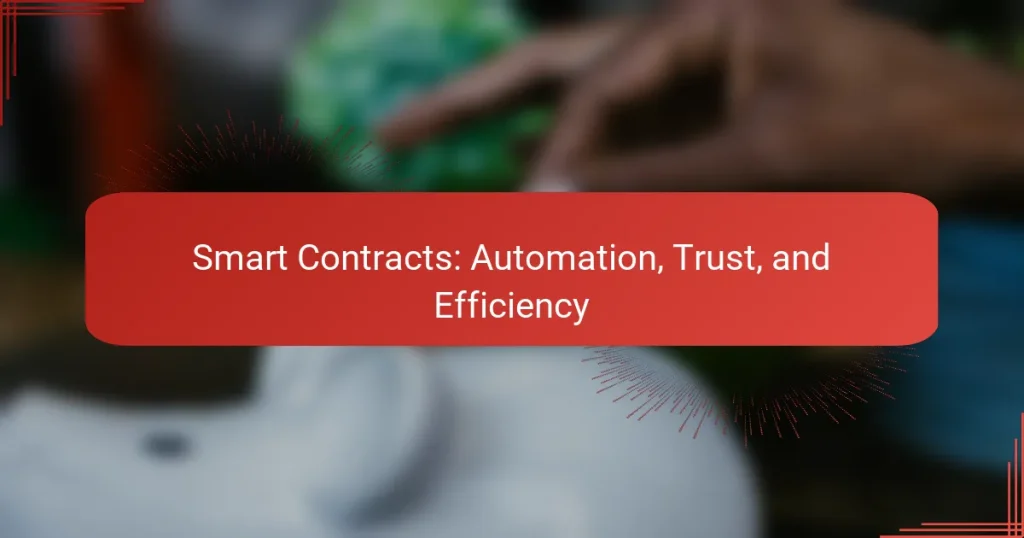Smart contracts revolutionize the way agreements are executed by automating transactions based on predefined conditions, thereby increasing efficiency and reducing reliance on intermediaries. By ensuring transparency and security, they foster trust among parties involved, minimizing the risk of fraud and enhancing compliance with contract terms. This innovative technology is particularly beneficial in sectors like finance and supply chain management, where it streamlines processes and facilitates real-time data sharing.
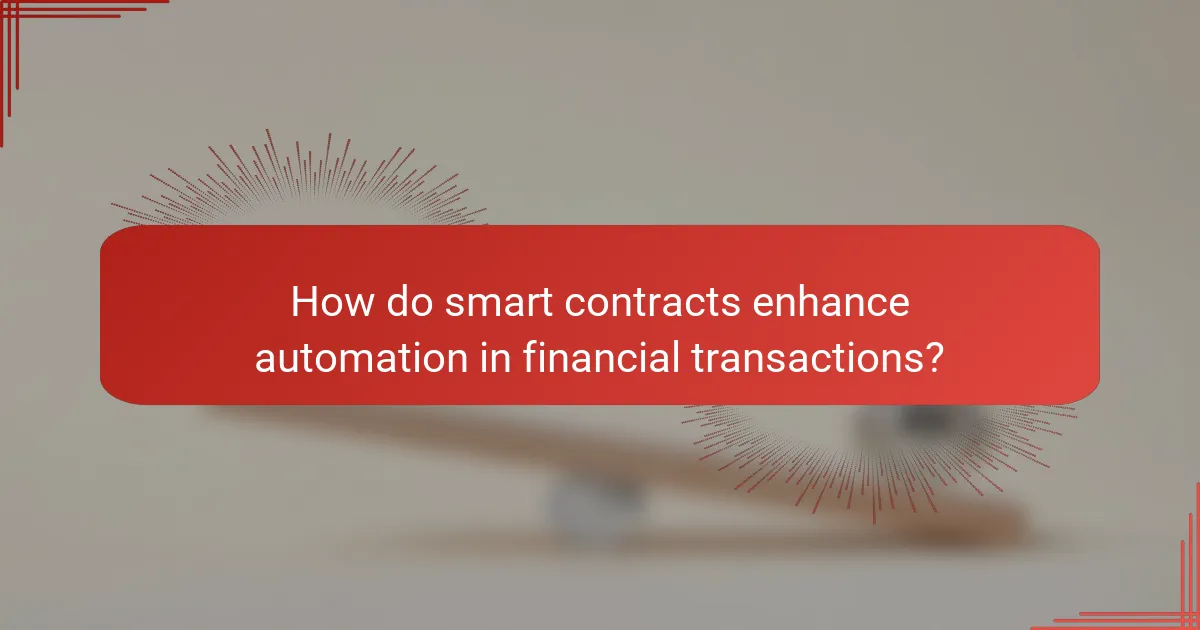
How do smart contracts enhance automation in financial transactions?
Smart contracts enhance automation in financial transactions by executing predefined agreements automatically when certain conditions are met. This reduces the need for intermediaries, streamlining processes and increasing efficiency.
Automated payment processing
Smart contracts facilitate automated payment processing by triggering transactions based on specific criteria without manual intervention. For example, in a real estate deal, once the buyer makes a payment, the smart contract can automatically transfer ownership of the property, ensuring a seamless transaction.
This automation can significantly reduce processing times and costs associated with traditional payment methods, which often involve banks or payment processors. By using cryptocurrencies or digital tokens, transactions can be settled in minutes rather than days.
Self-executing agreements
Self-executing agreements are a hallmark of smart contracts, where the contract’s terms are coded into the blockchain. Once the conditions are met, the contract executes itself without the need for external enforcement, ensuring that all parties adhere to the agreed terms.
For instance, in a supply chain scenario, a smart contract can automatically release payment to a supplier once goods are delivered and verified. This reduces disputes and enhances trust among parties involved.
Reduced transaction times
Smart contracts significantly reduce transaction times by eliminating the need for intermediaries and manual processing. Transactions that traditionally take days can often be completed in a matter of minutes or even seconds, depending on the blockchain’s efficiency.
For example, cross-border payments that typically involve multiple banks and currency conversions can be executed almost instantly using smart contracts, making them a preferred choice for international transactions.
Minimized human error
Minimized human error is a critical advantage of smart contracts, as they operate on predefined rules coded into the blockchain. This automation reduces the likelihood of mistakes that can occur during manual processing, such as data entry errors or miscommunication.
By relying on smart contracts, businesses can ensure that transactions are executed exactly as intended, leading to greater accuracy and reliability in financial dealings. This is particularly beneficial in industries where precision is essential, such as finance and healthcare.

What are the benefits of using smart contracts for trust?
Smart contracts enhance trust by automating agreements in a secure and transparent manner. They eliminate the need for intermediaries, reducing the risk of fraud and ensuring that all parties adhere to the terms of the contract.
Immutable records
Smart contracts create immutable records on a blockchain, meaning once a contract is deployed, its terms cannot be altered. This permanence ensures that all parties have access to the same, unchangeable information, which fosters trust and accountability.
For example, if a smart contract governs a real estate transaction, all details regarding the sale are permanently recorded. This prevents disputes over contract terms, as the original agreement is always accessible and verifiable.
Transparent execution
Smart contracts execute automatically when predefined conditions are met, providing transparency throughout the process. All actions taken by the smart contract are visible to all parties involved, which helps to build trust and ensures compliance with the agreed terms.
In practice, this means that if a payment is contingent upon the delivery of goods, the smart contract will only release funds once the delivery is confirmed. This clear execution process minimizes misunderstandings and enhances confidence among participants.
Decentralized validation
Smart contracts rely on decentralized networks for validation, which reduces the risk of manipulation by any single party. This decentralized approach means that multiple nodes must agree on the validity of a transaction, further enhancing trust in the system.
For instance, in a supply chain scenario, various stakeholders can independently verify that a shipment has met all conditions before a payment is processed. This collective validation process ensures that all parties can trust the outcome without relying on a central authority.
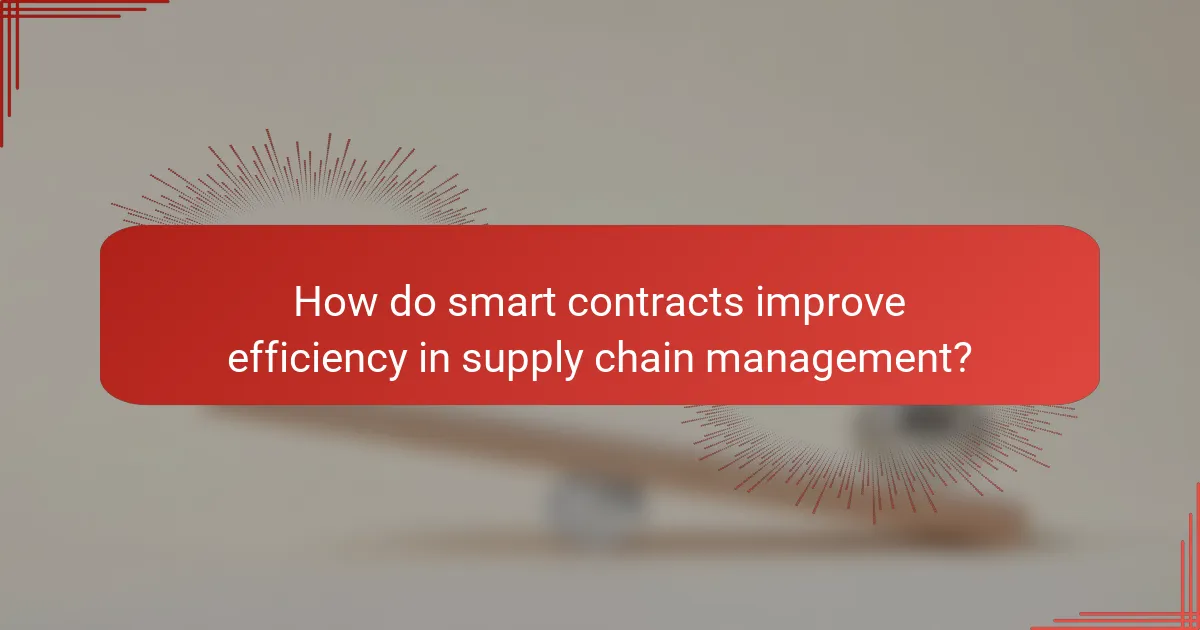
How do smart contracts improve efficiency in supply chain management?
Smart contracts enhance efficiency in supply chain management by automating processes, reducing delays, and minimizing errors. They facilitate real-time data sharing and enforce agreements automatically, leading to faster transactions and improved trust among stakeholders.
Real-time tracking
Smart contracts enable real-time tracking of goods as they move through the supply chain. By integrating with IoT devices, they provide continuous updates on the location and condition of products, allowing stakeholders to monitor progress and respond quickly to any issues.
This transparency helps reduce losses and enhances accountability, as all parties can verify the status of shipments at any time. For example, a retailer can track inventory levels and automatically reorder stock when it falls below a certain threshold.
Streamlined documentation
Smart contracts simplify the documentation process by digitizing and automating record-keeping. Traditional supply chains often involve extensive paperwork, which can lead to delays and errors. With smart contracts, all relevant documents are stored on a blockchain, ensuring they are easily accessible and tamper-proof.
This streamlined approach reduces administrative overhead and allows for quicker verification of transactions. For instance, invoices can be automatically generated and sent once a delivery is confirmed, speeding up payment processes.
Automated compliance checks
Smart contracts can automate compliance checks by embedding regulatory requirements directly into the contract code. This ensures that all parties adhere to necessary standards without manual intervention, reducing the risk of non-compliance penalties.
For example, a food supplier can set conditions that verify compliance with health regulations before a shipment is released. This not only saves time but also enhances trust among consumers and partners, as compliance is assured through automated processes.
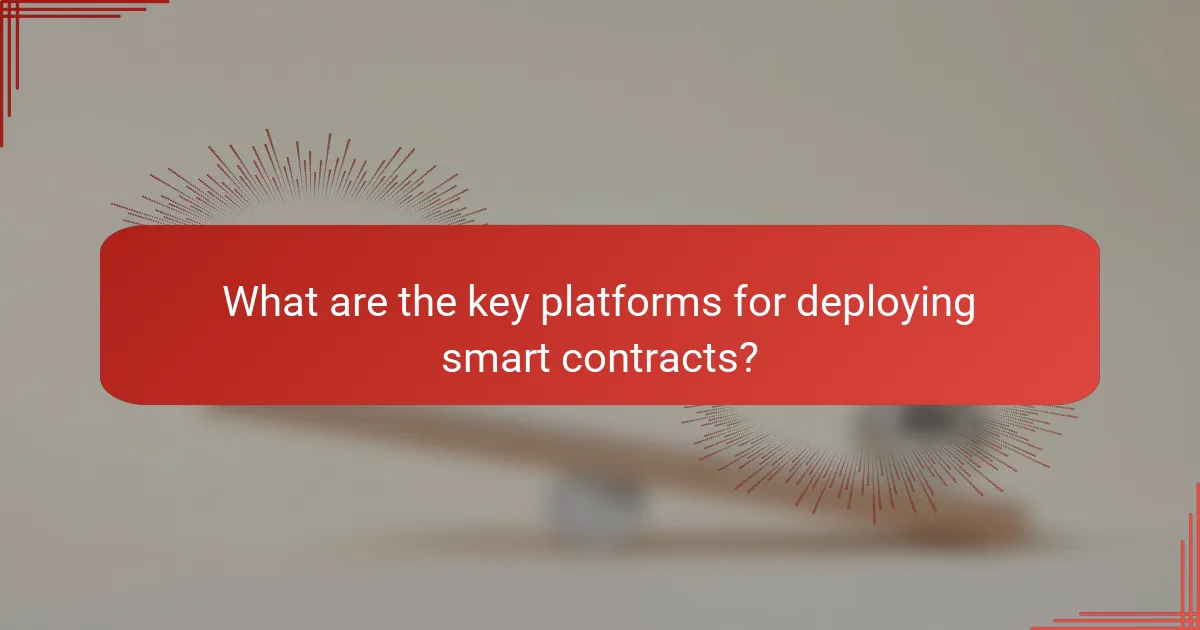
What are the key platforms for deploying smart contracts?
Several key platforms facilitate the deployment of smart contracts, each with unique features and use cases. The most notable include Ethereum, Hyperledger Fabric, and EOSIO, which cater to different needs ranging from public blockchain applications to private enterprise solutions.
Ethereum
Ethereum is the most widely used platform for deploying smart contracts, primarily due to its robust ecosystem and developer support. It operates on a public blockchain, allowing anyone to create and execute contracts using its native currency, Ether (ETH).
Developers can leverage Ethereum’s Solidity programming language to write smart contracts, which are stored and executed on the Ethereum Virtual Machine (EVM). This platform is ideal for decentralized applications (dApps) and initial coin offerings (ICOs), but users should be aware of potential high transaction fees during network congestion.
Hyperledger Fabric
Hyperledger Fabric is a permissioned blockchain framework designed for enterprise solutions, emphasizing security and scalability. Unlike Ethereum, it allows organizations to create private networks where participants are known and trusted.
Smart contracts in Hyperledger Fabric are called chaincode and can be written in languages such as Go or Java. This platform is suitable for industries requiring compliance and confidentiality, such as finance and supply chain management, but it may lack the extensive public reach of Ethereum.
EOSIO
EOSIO is known for its high transaction speeds and scalability, making it a strong contender for applications requiring rapid execution. It utilizes a delegated proof-of-stake consensus mechanism, which allows for faster block production compared to Ethereum.
Developers can create smart contracts using C++ or a similar language, and the platform supports a wide range of dApps. However, users should consider the resource allocation model of EOSIO, which may require purchasing tokens to access network resources, impacting overall costs.
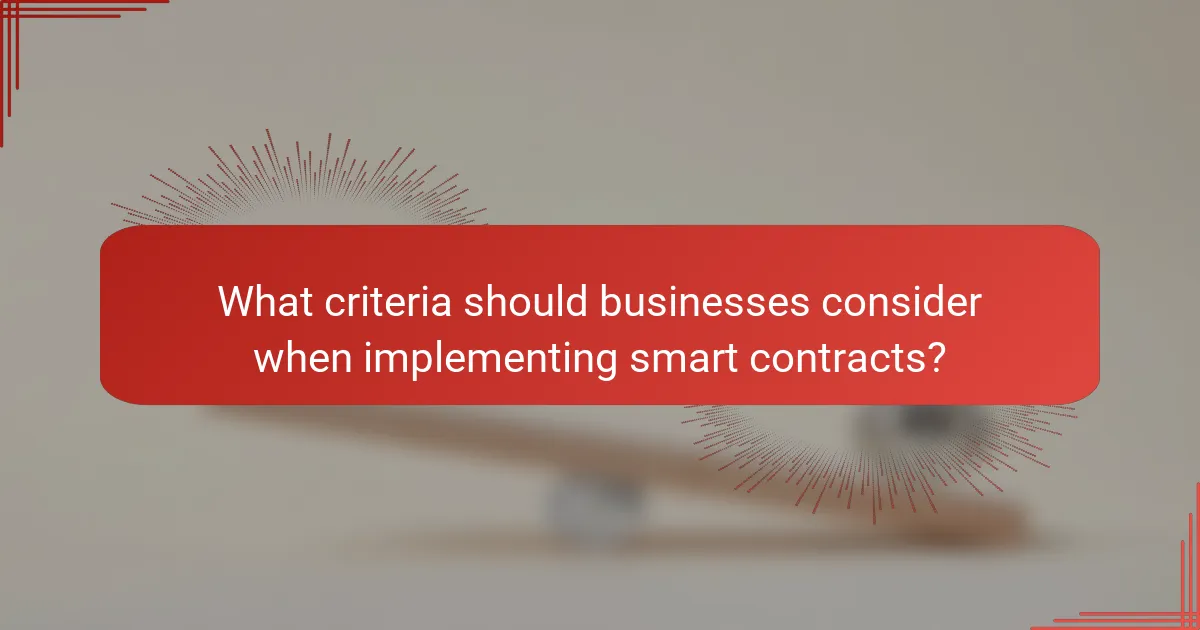
What criteria should businesses consider when implementing smart contracts?
Businesses should evaluate integration with existing systems, cost of deployment, and regulatory compliance when implementing smart contracts. These factors significantly influence the effectiveness and feasibility of smart contract solutions in their operations.
Integration with existing systems
Seamless integration with current software and processes is crucial for the successful implementation of smart contracts. Businesses should assess how well smart contracts can interface with existing databases, APIs, and workflows to avoid disruptions.
For instance, if a company uses a specific customer relationship management (CRM) system, the smart contract should be compatible to ensure data flows smoothly. Conducting a thorough analysis of existing infrastructure can help identify potential integration challenges early on.
Cost of deployment
The cost of deploying smart contracts can vary widely based on complexity and the technology stack used. Businesses need to consider not only the initial development costs but also ongoing maintenance and potential transaction fees associated with blockchain networks.
For example, deploying a simple smart contract on a public blockchain might incur lower costs compared to a complex solution requiring private blockchain infrastructure. It is advisable to create a budget that accounts for all phases of deployment to avoid unexpected expenses.
Regulatory compliance
Regulatory compliance is a critical factor when implementing smart contracts, as laws governing digital contracts and blockchain technology can differ significantly by jurisdiction. Businesses must ensure that their smart contracts adhere to relevant regulations to avoid legal issues.
For instance, in the European Union, the General Data Protection Regulation (GDPR) may impact how personal data is handled within smart contracts. Consulting with legal experts familiar with local laws can help businesses navigate compliance requirements effectively.
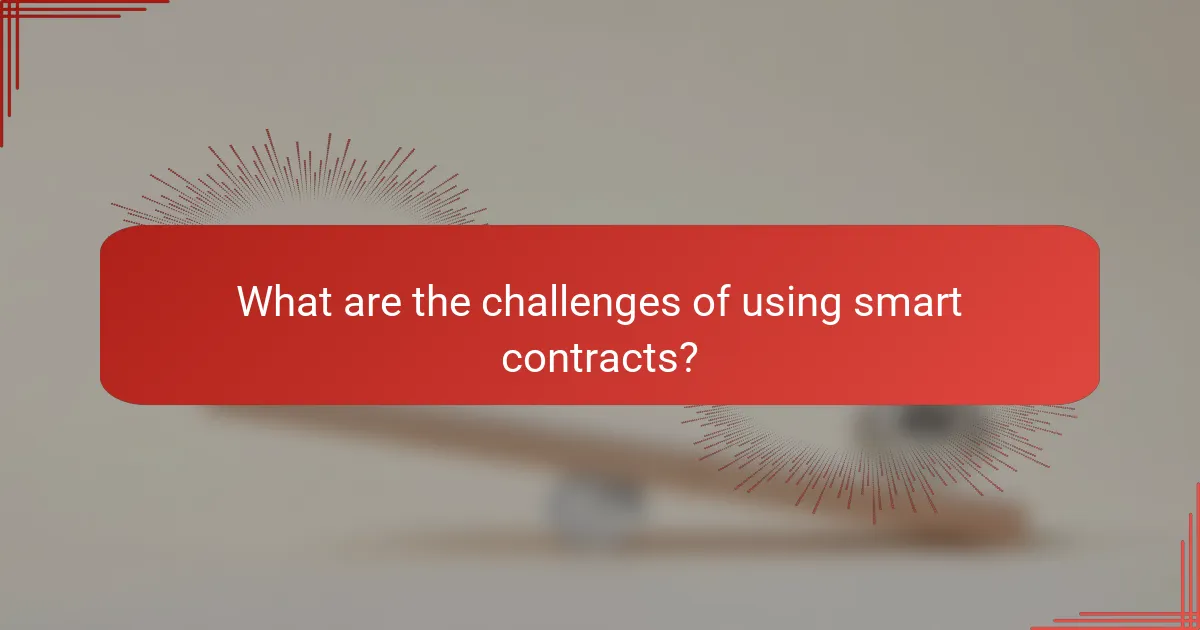
What are the challenges of using smart contracts?
Smart contracts face several challenges that can hinder their adoption and effectiveness. Key issues include legal recognition, technical complexity, and security vulnerabilities that can lead to significant risks.
Legal and Regulatory Issues
Smart contracts often operate in a gray area of legality, as many jurisdictions have not yet established clear regulations. This uncertainty can create challenges for businesses looking to implement them, as they may face legal disputes or compliance issues. It’s essential to consult legal experts familiar with blockchain technology and local laws before deploying smart contracts.
Technical Complexity
The development and deployment of smart contracts require specialized technical skills. Many organizations may lack the necessary expertise, leading to poorly designed contracts that can malfunction or be exploited. Investing in skilled developers and conducting thorough testing can mitigate these risks.
Security Vulnerabilities
Smart contracts are susceptible to various security threats, including coding errors and vulnerabilities that can be exploited by malicious actors. High-profile hacks have demonstrated that even minor mistakes can lead to significant financial losses. Regular audits and adherence to best coding practices are crucial to enhance security.
Interoperability Challenges
Smart contracts often operate on specific blockchain platforms, which can lead to interoperability issues when trying to interact with other systems. This limitation can restrict their functionality and usability across different networks. Utilizing standardized protocols and exploring cross-chain solutions can help address these challenges.
Scalability Concerns
As the number of transactions increases, many blockchain networks face scalability issues, which can slow down processing times and increase costs. This can be particularly problematic for applications requiring high transaction throughput. Solutions like layer-2 scaling or alternative blockchain technologies may be necessary to improve performance.
